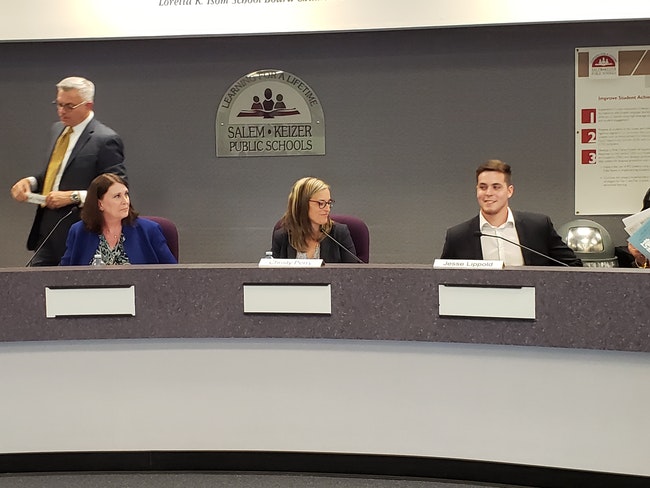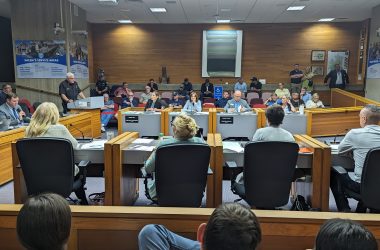 Marty Heyen, left, and Jesse Lippold, right, take new seats during a Salem-Keizer School Board meeting after being unanimously elected chair and vice chair for the 2019-20 school year next to Superintendent Christy Perry, center. (Rachel Alexander/Salem Reporter)
Marty Heyen, left, and Jesse Lippold, right, take new seats during a Salem-Keizer School Board meeting after being unanimously elected chair and vice chair for the 2019-20 school year next to Superintendent Christy Perry, center. (Rachel Alexander/Salem Reporter)
Marty Heyen was braced for a long school board meeting as community passions over racism and policing boiled up by the day.
The embattled chair of the Salem-Keizer School Board opened the meeting on Tuesday, June 23, by addressing criticism aimed at her.
Heyen had been accused of associating with members of the Three Percent, a conservative militia organization, and failing to step in as another board member concealed himself with a Black man’s face during a March board meeting.
But the meeting quickly took a turn Heyen wasn’t expecting.
Superintendent Christy Perry publicly criticized the board – her bosses – for discounting the experiences of students of color in discussions about removing police from local schools. She said the board has failed to take their professed commitment to equity seriously.
Heyen’s face betrayed little emotion, but in an interview last Thursday she said she was “shocked” by Perry’s comments.
“I was just really taken aback. I thought it was unprofessional. And it was very hurtful. And I’m still very much hurting from it,” Heyen said.
Heyen, a retired state IT worker, was elected to the board in 2015. She represents the zone including northeast Salem and McKay High School, but like all board members, is elected at-large, campaigning across the district.
In 2017, she challenged state Rep. Teresa Alonso Leon, D-Woodburn, running as the Republican nominee for House District 22. Heyen lost that election and then sought a second term on the school board.
In May 2019, she defeated challenger Raul Marquez Guerrero, a recent McKay High School graduate who worked to establish a youth homeless shelter in Salem.
The school board elects its own chair and vice chair annually and unanimously voted Heyen into the role last summer. She took the helm of a relatively inexperienced school board – five of the seven directors were serving a first term.
Until the June 23 meeting, she said, she considered her working relationship with Perry to be good.
“I helped her by being a funnel so she could do her job and not be overwhelmed. I worked to help her in our mission under our policies to get the work of the district done. I did pretty much anything she asked me to do or anything she asked for,” she said of Perry.
The school board now finds itself under community pressure to reform itself and the school system. Community groups are pressuring the board – and the Salem City Council – to get police officers out of school.
Students and alumni have long publicly shared accounts of being racially profiled, disciplined or arrested at school while white peers faced few consequences for similar behavior and say the school board and district leadership has done little in response. Now, their calls for change are getting renewed attention from the district and community.
Heyen finds herself at the center of a controversy that’s enveloped the full seven-member school board that also includes Paul Kyllo, Kathy Goss, Sheronne Blasi, Jesse Lippold, Satya Chandragiri and Danielle Bethell.
Sandra Hernández-Lomelí, director of Latinos Unidos Siempre, took Heyen to task during the June 23 board meeting, conducted online.
“Heyen has openly opposed our calls for racial equity in the school district again and again and we’re tired of that,” Lomeli said, “For the last years I have been attending school board after school board meeting to plead that you listen to Black and brown students. We now know why we have been ignored. Our school board is made up of white supremacists and people who ignore racism when they see it occur.”
Kyllo himself is being intensely criticized for what he now says was a misunderstood stunt at a March board meeting, where he held up to his face a cardboard cutout of a Black Trailblazer player. An online petition circulated by youth advocacy group Latinos Unidos Siempre calling for his resignation on Monday had 3,200 names. Leaders of the group said his actions were unacceptable and his April apology inadequate.
Heyen said in the June 23 meeting she didn’t act against Kyllo because she was “in shock” at his actions and was still adjusting to the format of Zoom meetings.
“I really just didn’t know what to do. After that meeting, our host made me co-host so that I could remove video or audio should it become necessary. Had it happened again I would have turned his video off,” she said.
She said she promptly responded to the Salem-Keizer NAACP and addressed Kyllo’s conduct in a subsequent board meeting before the video gained widespread attention, though said she couldn’t recall the date of that meeting.
But that petition also calls for Heyen to resign, both for her conduct in the board room and for her alleged ties to militia and far-right groups many describe as white supremacist.
A website set up this week, ResignMartyHeyen.com, analyzes a widely-circulated image from Heyen’s 2019 school board campaign, contending she appeared with members of local militia groups. The site’s creator, Salem resident Chris Young, also started a Change.org petition calling for Heyen to resign which has gathered over 4,000 signatures, separate from a Latinos Unidos Siempre petition.
Many students testifying at the board meeting last week or protesting to end policing in schools referred to Heyen as a racist and white supremacist.
In that campaign photo, Heyen, and her husband pose with Angela Roman, a former GOP congressional candidate and member of the Three Percent, according to her attorney from a 2017 case. During anti-police brutality protests earlier this month, Roman was among those standing guard outside Glamour Salon, a downtown business that’s been subject of controversy. Others in the campaign photo are flashing a gesture often signifying affiliation with the Three Percent.
 A widely-circulated photo from Marty Heyen’s 2019 school board re-election campaign includes Angela Roman, a member of the Three Percent who was among those standing guard outside Glamour Salon during anti-police brutality protests. Heyen said she knows Roman through her school board work and didn’t know others in the photo.
A widely-circulated photo from Marty Heyen’s 2019 school board re-election campaign includes Angela Roman, a member of the Three Percent who was among those standing guard outside Glamour Salon during anti-police brutality protests. Heyen said she knows Roman through her school board work and didn’t know others in the photo.
Heyen said she knows Roman through her work on the school board. Roman reached out to her with concerns because her child’s elementary school teacher was describing President Donald Trump as a bully, Heyen said. She looked into the issue as a board member and said Roman in turn came out to support her re-election.
“This mom came out to support me and she brought her mother and her mother’s boyfriend. I had never met, nor have I met since, either of them. I don’t know their names,” Heyen said, referring to others who appear in the photo. Heyen described Roman as an acquaintance and said they’ve met a few times but don’t know each other well.
“I don’t even know what her personal beliefs are on different things, other than she loves this country I believe,” Heyen said.
The Three Percent movement was formed in 2008 and it draws its name from the disputed idea that only 3% of American colonists actively took up arms against Great Britain during the war for independence. Members of the group marched alongside white supremacists and neo-Nazis in Charlottesville, Virginia, in 2017, prompting the group to issue a “stand down” order telling members to stop affiliating with white supremacists.
Spencer Sunshine, a longtime researcher of far-right groups who has authored reports on their reach in Oregon, said that Three Percent is a decentralized movement. Some people associated with the movement are more moderate and the group can serve as a social club for members who will engage in community service activities.
Sunshine said the Three Percent is “not racially focused,” is open to people of all racial backgrounds and is concerned with gun rights and government regulations.
But he said there is a current of Islamophobia, anti-immigrant sentiment, white supremacy and conspiracy theories in the group.
Heyen said she’s not a member of the group herself, but her husband Jeff, chair of the Marion County Republican Party, is a member who’s attended a few meetings to teach members about getting involved in politics. She has other friends who are members, she said.
At the recent school board meeting, Heyen disputed that the organization held white supremacist views.
She responded to Sandra Hernández-Lomelí’s comment by referencing a Black acquaintance she said was part of the group.
“I’m hoping that Ronny is listening, who’s a very black person and member of the Three Percent. I’m sure he’ll be surprised to find out he’s now a white supremacist,” she said.
She said she can’t speak for the values of the people in the photo she doesn’t know, but said she doesn’t associate with racists.
“My son is a person of color,” she said. She said criticism of groups like the Three Percent is often driven by “people who don’t like conservative values.”
Calls for her resignation underlie a deeper conflict over how the school board has responded to the concerns of students of color and immigrant students. There is a history of mistrust of local schools, district administrators and the school board among communities of color in Salem.
The district has over 1,600 immigrant students in a student body of about 41,000, district spokeswoman Lillian Govus said. Thousands more students are not immigrants themselves but have immigrant parents or relatives.
Leaders of Latinos Unidos Siempre and the Salem-Keizer NAACP say they’ve raised concerns for years about students of color being disproportionately suspended, expelled and arrested in local schools with little or no response from administrators or the school board.
 Students organized by Latinos Unidos Siempre urged the new Salem-Keizer School Board to address the mental health needs of immigrant students and stop policies that disproportionately punish students of color at a July 2019 meeting. (Rachel Alexander/Salem Reporter)
Students organized by Latinos Unidos Siempre urged the new Salem-Keizer School Board to address the mental health needs of immigrant students and stop policies that disproportionately punish students of color at a July 2019 meeting. (Rachel Alexander/Salem Reporter)
Latino students, often organized by Latinos Unidos Siempre, have repeatedly spoken to the board about their fears of being targeted by federal immigration enforcement and said they feel unsupported by a board that has never had a Latino representative.
Heyen said she’s personally met with the Salem-Keizer Coalition for Equality, a Latino parent group that puts on reading workshops and helps parents understand how to help their kids in school.
She has never met with or sought a meeting with Latinos Unidos Siempre and said that until a few weeks ago, she had never heard of the group, despite their regular presence at school board meetings in recent years. When students affiliated with the group have spoken about their experiences with discipline and arrest in schools, Heyen said she saw them as individuals, not as part of a larger organization.
She said she needs to hear more stories of how students have been affected firsthand rather than general statements about the “school to prison pipeline,” though student and alumni testimony in recent board meetings has included such personal accounts in addition to more general comments and calls for removing police.
Heyen said the format of public comment, where board members simply listen, isn’t conducive to her understanding issues because she can’t ask clarifying questions.
“Because I haven’t had the conversations with these kids directly to really understand other than a few key words that they say, I don’t really understand what’s going on. And that’s important to understand,” she said.
But she said she doesn’t plan to initiate a meeting with Latinos Unidos Siempre now because district leaders, not board members, are the ones in touch with their leadership.
“I wouldn’t even know who to reach out to,” she said.
Heyen sees much of the controversy now surrounding her as a matter of partisan politics. Some of the Latino community and political groups who regularly work with the Salem-Keizer School District, including PCUN, Oregon’s farmworkers union, endorsed and raised money for her opponents in both the House and 2019 school board races.
RELATED COVERAGE: In nonpartisan school board races, interest groups spend thousands
Marquez Guerrero, her school board opponent, was among those calling for her resignation in last week’s board meeting.
“Year after year students have been present at board meetings to express their concerns and yet time and time again, you have failed to listen to them,” he said. He referred to her alignment with “white supremacists and anti-immigrant hate groups.”
Heyen is a conservative Republican, a political ideology she shares with a majority of the board. She’s said little about immigration during board meetings, but appeared at a February 2018 meeting of Oregonians For Immigration Reform along with Republican congressional candidate Joey Nations, according to the group’s website.
The group advocates to “stop illegal immigration as well as reduce legal immigration to a more environmentally, economically and socially sustainable level” and was behind a 2014 ballot measure repealing a state law that had allowed undocumented immigrants to get driver’s licenses.
Heyen at the time serving was running for state representative in the district covering northeast Salem and Woodburn. She disputed the characterization of Oregonians for Immigration Reform as a hate group and said she has attended about three of its meetings.
“I don’t consider supporting lawful immigration a racial issue since many races do cross the border unlawfully,” she said in an email.
At the time, a ballot initiative proposed repealing Oregon’s “sanctuary laws,” which limit cooperation between law enforcement and federal immigration enforcement.
In Salem, law enforcement leaders said the measure would hurt trust with immigrant communities and the Salem City Council opposed it. So did other school boards around the state. The Salem-Keizer School Board stayed silent.
A majority of the board said they didn’t feel it was their place to wade into politics. Heyen was among them, and told Salem Reporter after a September 2018 meeting that she hadn’t yet read the measure and didn’t have an opinion on it. One week later, Oregonians For Immigration Reform listed Heyen among legislative candidates who supported the measure. Voters subsequently defeated the measure.
Asked this week about her relationship with Oregonians for Immigration Reform and the ballot measure, Heyen wouldn’t explain her view of the immigration measure, though she did not deny supporting it.
“I believe in legal immigration but we’re a sanctuary state and our school district is a safe place for all our kids, regardless of their immigration status. We don’t have their status. I don’t want to know it. I just want to help them graduate. That’s all I have to say,” she said.
When the board has faced criticism for not supporting immigrant students, she pointed to a district policy that local schools welcome in schools regardless of immigration status and that the district will not allow federal immigration officials into schools without a warrant. She said this week she wants her personal views about ballot measure to remain private and reiterated those district policies as sufficient to address student concerns.
Heyen’s apparent support of immigration measure and her willingness to appear with Oregonian for Immigration Reform put her increasingly at odds with parents, students and community leaders concerned about equity and racism. In Salem-Keizer schools, 40% of students are Latino and many come from immigrant families. A persistent complaint of both the board and Heyen is that they are unable or unwilling to believe students of color about their own experiences with police and immigration enforcement, or take action to support them.
“Her being Republican or being an active member of the Republican Party, for me it’s not a concern in and of itself. People can join whatever party they choose. But it is that she’s very connected to some very fringe elements in the Republican Party,” said Levi Herrera-Lopez, executive director of Mano a Mano and a member of the district budget committee.
Herrera-Lopez is one of several Latino candidates who have run unsuccessfully for school board in recent years, narrowly losing a 2017 election to Jesse Lippold.
He said while Heyen draws a line between her personal beliefs on immigration and district policies toward students, he doesn’t believe it’s possible to separate the two.
“It would take a very skilled leader to be able to separate that,” he said. “One way to show that she really doesn’t have those views is to engage honestly in a process of listening to the students. That hasn’t happened. Until that happens, I would say she hasn’t done much to counter the community’s perspective of her right now. And that’s all on her: she could take the action,” he said.
Heyen said she wants to listen to all students and committed the school board on June 23 to leading a community discussion about the future of police in schools. She said this week she wants to talk with students about how police work in schools could improve while they still investigate reports of child abuse and keeping kids “out of the school to prison pipeline.”
Those changes could include revised job descriptions, different uniforms and a review board tasked with fielding and responding to complaints about officers, she said. But she said she’s not open to completely removing officers from schools, the demand made Latinos Unidos Siempre and other groups.
“I think they’re necessary for the safety of the kids and our teachers,” she said.
She hasn’t talked to Perry since the meeting or read the over 150 written comments submitted to the board. She said she plans to do so later. She said she wasn’t prepared for the vehemence of public comments or the calls for her to resign.
“It’s very hard to sit and be quiet and listen to people lie about you and assassinate your character. It’s very hard. I challenge anybody to try and sit through what I sat through,” she said of the meeting.
The board will meet on Wednesday, July 1, to elect its next chair and vice chair. Heyen said she doesn’t intend to serve as chair again.
She has no intention of resigning. She believes some citizens have formed a false impression based on several widely shared photos on social media and what she described as her actions in ”not saying the right thing, reacting in the right way or in some cases remaining silent” during the meeting.
“If I resign I think that sets the precedent that people can say whatever they want about you and people will decide it’s true,” she said.
Jake Thomas contributed reporting.
SUPPORT ESSENTIAL REPORTING FOR SALEM – A subscription starts at $5 a month for around-the-clock access to stories and email alerts sent directly to you. Your support matters. Go HERE.
Contact reporter Rachel Alexander: [email protected] or 503-575-1241.

Rachel Alexander is Salem Reporter’s managing editor. She joined Salem Reporter when it was founded in 2018 and covers city news, education, nonprofits and a little bit of everything else. She’s been a journalist in Oregon and Washington for a decade. Outside of work, she’s a skater and board member with Salem’s Cherry City Roller Derby and can often be found with her nose buried in a book.









